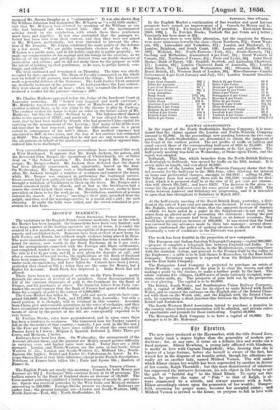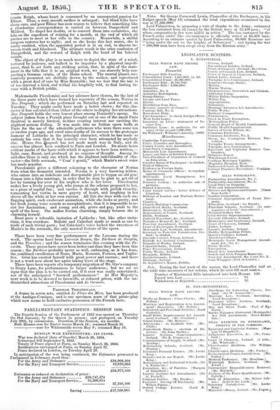tOt tOratrts.
The new piece produced at the Haymarket, with the title Second Love, may fairly rank a degree higher than the generality of modern pro- ductions; for, at any rate, it turns on a definite idea and works out a fixed purpose. Elinor Mowbray, a young lady afflicted with blindness, is madly in love with Captain Dangerfield; who, hearing that she is legatee of a large fortune, before she herself is aware of the fact, has wooed her in the disguise of an humble artist, though his affections are really set on another lady, named Mildred Vernon. The will under which Elinor claims her wealth has been superseded by another in favour of her cousin, Ralph Thornhill; but this most disinterested of relations has suppressed the intrusive document, his sole object in life being to act the part of "faithful dog" to the blind Elinor. To carry out this notion, he prefers the name of " Fido " to that of Ralph, is al- ways summoned by a whistle, and always answers with a bark. Elinor accordingly enters upon the possession of her wealth ; Danger- field, resuming his proper name, becomes her accepted suitor ; and Mildred Vernon is invited to the house, on purpose to fall in love with cousin Ralph, whose heart is consumed by an unsuspected passion for Elinor. Thus, a very smooth surface is arranged; but blind folks have sharp ears, and poor Elinor has soon reason to believe that something like a clandestine correspondence is carried on between Dangerfield and Mildred. To dispel her doubts, or to convert them into certainties, she hits on the expedient of retiringfor a month, at, the end of which all parties are to meet at her villa in the country. Meanwhile, a skilful surgeon restores her to sight ; and as she keeps this fact secret, she is easily enabled, when the appointed, period is at an end, to discern be- tween truth and falsehood. The ultimate result is the utter confusion of Dangerfield, and the reward of Ralph with the hand of his beloved cousin.
The object of the play is so much more to depict the state of a mind, tortured by jealousy, and balked in its inquiries by a physical impedi- ment, than to set forth any striking action, that, m spite of the state- ment in the bills that it is an original work, we can scarcely help sus- pecting a German origin, of the Halm schooL The mental phases suc- cessively presented are skilfully drawn by the author, and reproduced with a great deal of Care by Miss Reynolds ; but we fear that the tale is of too internal a kind, and withal too lengthily told, to find lasting fa- vour with a British public.



































 Previous page
Previous page